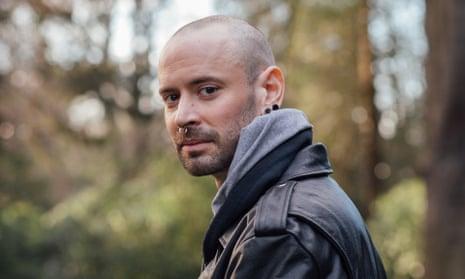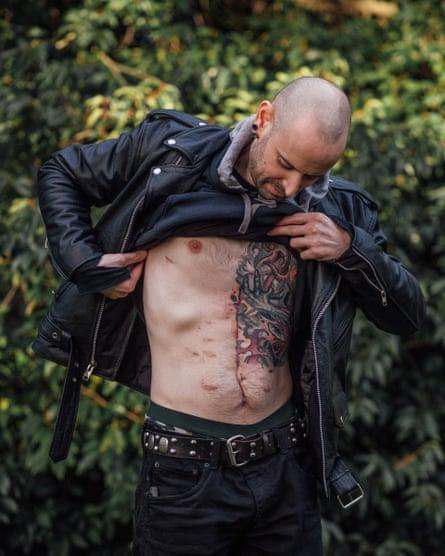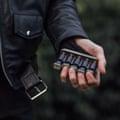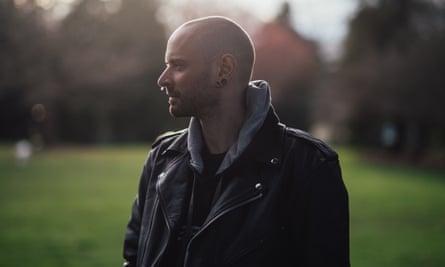Julia Carrie Wong
'I refuse to be like them': why the man shot while protesting Milo Yiannopoulos doesn't want revenge
On inauguration night, Josh Dukes was shot during a speech by the rightwing provocateur at the University of Washington. But now he’s seeking reconciliation
4 Apr 2017

Josh Dukes, an anti-fascist, says there is a tendency to forget that people on the other side of the political spectrum are people too. Photograph: Rafael Soldi/The Guardian
“I was the first protester shot under the Trump administration,” said Josh Dukes, a 34-year old computer security engineer, on a recent afternoon in a Seattle coffee shop. “Hopefully I’m the last.”
Tall and lanky, with a nose ring, black leather jacket, tattoos, and combat boots that offer a clue to his political philosophy – anarchism – Dukes, who also goes by the handle “Hex”, is conscious of his role as the embodiment of the violent political polarization that has marked the onset of the Trump era.
On the night of Trump’s inauguration, Dukes travelled to Red Square, a plaza on the University of Washington’s Seattle campus, to protest against a speech by the rightwing provocateur Milo Yiannopoulos. Unlike some of his fellow anti-fascists, Dukes made no effort to disguise himself. While protesters in black face masks squared off against Trump supporters in red “Make America Great Again” hats, Dukes says that he attempted only to “peacefully de-escalate” conflict.
Then, he was shot.
The bullet ripped through his abdomen and exited his back. Anarchist street medics raced to apply pressure to the wound. An ambulance arrived and rushed him to the hospital.

Josh Dukes shows his scar from the shooting at the University of Washington’s campus in Seattle. Photograph: Rafael Soldi/The Guardian
Two months later, Dukes still bears an oozing wound and a long, angry surgical scar. He has lost his gall bladder and half his colon. His liver was severely damaged; his diaphragm pierced. He spent the first month of the Trump presidency in the hospital, undergoing numerous surgeries, fighting off an infection, and high on pain medication that, he said, made the political upheaval of policies like the travel ban “a lot easier to deal with”.
But while Dukes’ ravaged body bears the scars of the country’s current political fissure – “Me getting shot is a manifestation of Trump’s and Milo’s violent ideology,” he says – he hopes to offer a path to stopping the violence and de-escalating the conflict. He and his partner Sasha, who uses gender neutral pronouns and asked not to be identified with a last name out of fear of harassment, are requesting that the shooter not be sent to prison, but instead join them in a restorative justice process.
The key problem both Dukes and Sasha identify is dehumanization: a tendency to forget that people on the other side of the political spectrum are people too.
The anti-Milo protest was not Dukes’ first brush with the far right wing. Growing up in rural northern California and Oregon, he saw the ravages of meth addiction and racism on small-town communities. When an acquaintance asked him if he was “down with AB”, then explained that the acronym stood for “Aryan Brotherhood”, Dukes decided to get a crossed-out swastika tattooed on his arm, permanently identifying himself as an anti-fascist.
“I’m not going to be mistaken for that,” he said.
Maybe if we can have a larger conversation, we can turn this thing around. We have to start seeing each other as people
Duke, an anti-fascist protester
In conversation, Dukes combines his leftist political philosophy with the hyper-logical reasoning that allows him to excel as a computer security expert. He references games theory as proof of the superiority of anarchism, and cites Slovenian philosopher Slavoj Žižek in questioning whether a reporter can ever truly get to know him. When he was shot, he went through a mental version of threat modeling, analyzing his physical condition based on the available data: “I’m not dead right now so I haven’t been shot in the heart,” he recalls thinking.
The Red Square shooting brought together the lives of two radically different couples: leftwing activists Dukes and Sasha, and Mark and Elizabeth Hokoana, who have been identified by the media as the couple who turned themselves in to police after the shooting. Mark Hokoana wrote Facebook messages to Yiannopoulos and referenced his pro-Trump “#MAGA hat” on the day of the shooting. He was assumed to be the shooter until last week, when an attorney for his wife, Elizabeth Hokoana, told the Seattle Times that she had been the shooter, claiming that she acted in defense of her husband.
The self-defense claim has gained some steam in the media. A local TV station reported that emergency medical responders had found brass knuckles in Dukes’ pocket, based on a readout of the EMS radio dispatch. (Dukes finds this allegation both amusing and infuriating. Within a few minutes of meeting a reporter, he eagerly drew the “brass knuckles” out of his pocket, revealing what was actually a plastic finger strengthener used by guitarists.)
“They’re a married couple. I assume they love each other,” Sasha said of the Hokoanas. “I assume they know what it feels like when someone you love is threatened. There’s got to be some humanity somewhere.”

Josh Dukes’ finger strengthener, which he says was mistaken for brass knuckles. Photograph: Rafael Soldi/The Guardian
Both Sasha and Dukes are angry with the Hokoanas, who they believe acted with unjustifiable carelessness by bringing a gun to a protest and allegedly firing into a crowd of people. But they are resisting the impulse toward revenge, asking instead for a process that will allow both couples to heal from what has happened.
Sasha’s eyes brim with tears when they remember the night of the shooting, seeing Dukes’ body ripped apart, and being denied information about him because the pair were not yet married. (They married a few weeks after the shooting in the hospital; Dukes wore a tie with his hospital gown.)
“I can’t unsee those images,” Sasha said. “I want to share that burden. The people who did that need to see it. I want to sit down with them and show them the photographs. I really just want to know why.”
“They have to have really dehumanized Hex to not even realize that people care about him,” Sasha added. “I want them to see the damage they’ve caused to Hex, to me, to his friends, the community. He didn’t get to start his new job. I had to drop out of school.”
I can’t unsee those images. I want to share that burden. The people who did that need to see it
Sasha, Duke's partner
Having seen the damage that comes from forcibly removing a person from his friends and family, they don’t want to inflict it on anyone else.
“Shooting me or someone else cuts off all the things I could do with my life, my job, my relationships,” said Dukes. “Prison does something similar.”
As it stands, their offer of restorative justice has been rejected. “We agree that a restorative justice process could be helpful to both Mr Dukes and the Hokoanas. But while this is an open investigation and the state has the power to file charges, despite Mr Dukes’ wishes, Elizabeth and Marc are not able to participate,” said Kim Gordon and Steve Wells, attorneys for the couple, in a joint statement.

Josh Dukes has asked that his shooter not be sent to prison. Photograph: Rafael Soldi/The Guardian
“Washington law permits the use of force in order to defend someone in imminent danger of injury. We are confident that a jury, upon hearing what Elizabeth Hokoana saw, heard, and experienced, would find that she reasonably believed her husband was in immediate danger of great injury or death,” they added.
Dukes was studying the prison system at the time of the shooting, reading books like Slavery by Another Name and watching the documentary 13th, and he believes in the abolition of prisons.
“She’s going to go into a system that will eat her alive and that’s awful,” he says of Elizabeth Hokoana. “It’s hard to wish that on anyone.”
“Right now, we’re continually escalating violence,” Dukes said of the divide between the right and the left. “Maybe if we can have a larger conversation, maybe we can turn this thing around. We have to start seeing each other as people, and talk about how other people are people.”
“I refuse not to recognize these people as people, because I refuse to be like them.”